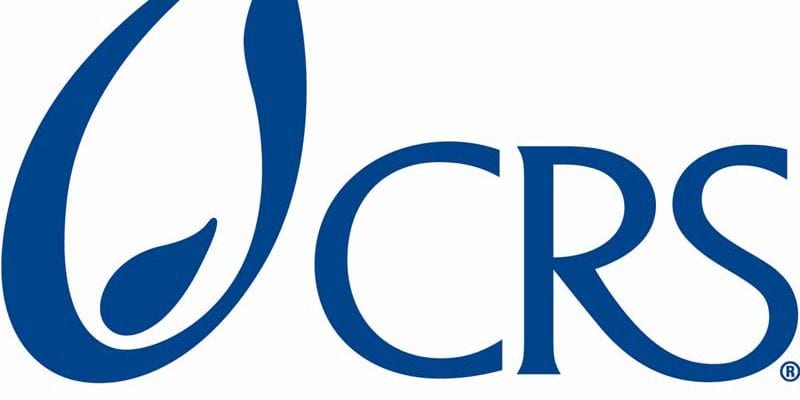Catholic Relief Services (CRS) is an international non-governmental organization supporting relief and development work in more than 100 countries around the world. CRS programs assist persons on the basis of need, regardless of creed, ethnicity or nationality.
Catholic Relief Services began working in Nigeria in the 1960s and was active during the 1967 civil war in the area of emergency response. After the war, the Nigerian government asked CRS and other international development agencies to leave the country. Thirty years later, with the return of democracy after years of military rule, CRS returned to Nigeria in 2000 at the invitation of the Catholic Bishops Conference of Nigeria. In partnership with the Catholic Church, other faith-based and community-based organizations, the private sector, local and international NGOs, and government institutions, CRS implements a range of complex programs with support from a variety of donors and private funds.
CRS operations in Nigeria are undertaken through local organizations in agriculture, emergency response, orphans and vulnerable children, health, HIV, governance and peace building. CRS has worked in 34 of the country’s 36 states, demonstrating the agency’s extensive grassroots networks and tremendous capacity to reach the rural poor.
We are recruiting to fill the position of:
Job Title: Consultant – Building Economically Sustainable Seed Systems for Cassava (BASICS-II) Private Sector Promoter Services
Location: Nigeria
Job Overview
- CRS agriculture program in Nigeria started in 2009 with the Emergency Rice Initiative implemented in collaboration with AfricaRice, the IFDC, the National Cereal Research Institute Badeggi and the Kano State Agricultural and Rural Development Authority. Between 2012 and 2016 CRS implemented the SCSS project funded by Bill and Melinda Gates Foundation (BMGF) in Benue and Oyo States in collaboration with National Root Crop Research Institute, National Agricultural Seeds Council, State Agricultural Development Programs and local NGOs.
- CRS also, as sub-recipient to International Potato Centre (CIP), implemented the Village Seed Entrepreneur (VSE) component of Building an Economically Sustainable Integrated Cassava Seed System (BASICS) Project in Benue state from April 2016 to May 2020. Currently, CRS is implementing the Development of Cassava Seed Entrepreneur (DCSE) component of Building Economically Sustainable Seed Systems for Cassava (BASICS-II) for the next five years being led by IITA.
- BASICS-II project will be implemented in Nigeria and Tanzania. BASICS-II project covers the entire cassava seed value chain, ranging from breeder to certified/farmer seed. The project’s vision is to provide farmers with access to affordable, quality-assured seeds of the cassava varieties in demand by local food and processor markets through the establishment of a commercially viable seed value chain operating across breeder, foundation, and commercial seed levels. This value chain will enable more efficient dissemination and adoption of new varieties to improve productivity, raise incomes of cassava growers and seed entrepreneurs, enhance gender equity, and contribute to inclusive agricultural transformation in Nigeria and Tanzania.
- The DCSE component of the BASICS-II project which is being implemented by CRS will include the aggregation of CSEs and cover production and marketing of certified planting materials of improved cassava varieties to farmers within and outside of Kogi and Benue states. In implementing the componet, CRS will identify, train and work with the Cassava Seed Entreprenures (CSEs) to plan and organize their seed production and marketing activities.
- The strategic objective of the DCSE component for Nigeria is to more than double the number of decentralized, commercially viable seed enterprises in Nigeria, while they increase in average size and aggregate into associations to facilitate marketing, quality control, and other services.
The project seeks to engage the services of Private Extension Service Promoter (PESP) in Benue and Kogi States. The PESP will:
- Be responsible for providing necessary briefing and mobilization of CSEs in the State of assignment,
- Be responsible for training and supporting the development of at least one new SEN in a new cassava growing area in the State of assignment,
- Be responsible for growing of existing networks and formation of new networks in the State of assignment,
- Be trained and also be responsible for providing required capacity strengthening of the networks in the State of assignment,
- Support the marketing of the CSE stems within and outside the State of assignment, and
- Support the CSEs and SENs in regualr updates of basics farm and network reecords.
Application Closing Date
7th September, 2020.
Method of Application
Interested and qualified candidates are to submit an application, current professional profile with references and an indication of the preferred State of interest for the provision of the services as a single attachment in MS word document to: tenders.ngr@crs.org using “BASICS-II Private Sector Promoter Services” as the subject of the email.
Note: Completed applications should reach us before the close of business, September 7, 2020, and only shortlisted candidates will be contacted.
Equal Employer Opportunity:
- CRS is an equal opportunity employer, does not discriminate based on race, colour, religion and we are committed to gender-sensitive programming and management etc.
- Qualified women are strongly encouraged to apply
Safeguarding:
- By applying to this job, I understand and acknowledge that CRS requires its staff to treat all people with dignity and respect and to actively prevent harassment, abuse, exploitation, and human trafficking.
- Further, I understand that if I am a successful candidate, I will be subject to a comprehensive background check, and my personal/professional references will be asked to evaluate my behaviors related to the above safeguarding-related topics.
Statement of Commitment to Protection:
- CRS recruitment and selection procedures reflect our commitment to protecting children and vulnerable adults from abuse and exploitation

